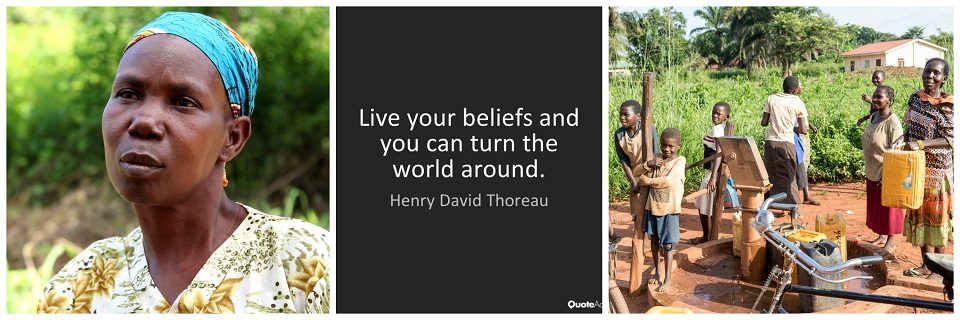Standing Up For Women

Modine Ephraim is the leader of a women’s group in South Sudan. She risked a lot by speaking up about something she didn’t think was right, and then something unexpected happened.
When we sat down to talk to her recently, she told us the story of how she once confronted a group of men from her community who were out drinking alcohol in public and causing a scene. She had seen it many times before, but on this particular day she was moved to say something.
“I don’t know what came over me. Thinking back to the day I realize I could have got myself in trouble.”
Modine went over to the men and told them that she did not approve of their behavior and that she felt it was setting a bad example for the people of their community, especially the children who looked up to them.
The next time she saw them, one of the men in the group sarcastically offered her a drink, reminding the others about her lecture about drinking in public. This didn’t surprise her.
But what happened next did.
One of the other men in the group stopped him, apologized, and said, “She is a leader in our community – a leader among women.”
This single act took a significant amount of courage, especially in a community where men are the primary decision makers and leaders, and where women are expected to respect and submit to them.
Modine explains that she took this experience as a calling from God to become a leader among the women of her community. She then began forming a group with other women to provide outreach and support to those in their community that are sick.
“We visit people who are sick and help them to get to the clinic. We also put together what little money we have to help those who really need it, so they can purchase medicine or food. We also provide care for children and help with cooking and other chores so that women who are ill are able to rest and get better.”
When we asked her what she felt was one of the biggest problems facing her community today, Modine didn’t hesitate. She talked about the lack of access to safe water.
“It has such an impact on so many parts of our lives.”
Currently, her community is miles away from the nearest safe water point, so they can only really gather water from unprotected wells and streams. The problem is that this water is contaminated, and while they do their best to boil the water they drink, too often the contaminated water gets ingested and leads to high incidences of waterborne disease. This is also one way that cholera is spread.
On those rare occasions when they take the long and challenging walk to the safe water point, they often encounter long lines and resistance from residents in the community where the well is located. Modine says she understand the resistance: “everyone is worried about water.”
When they are lucky enough to gain access to this well, they can only carry one jerry can, which holds five gallons of water – hardly enough for the drinking, washing, cooking and cleaning needs of an entire family.
Childcare is another big concern. When the women go to collect water, they leave their young children behind in the care of slightly older siblings. But this responsibility is sometimes too much and mothers often return to the sounds of babies crying.
What Modine really hopes for is a partner who will help to install a water point for her community.
“CMMB is an organization that helps people, and we are so glad that our voices are being heard. It means a lot to us that there are people living in other parts of the world who are concerned about our suffering and that they are moved to act and help bring change. I hope one day that we will have access to safe water in my village.“
Are you inspired by Modine like we are? You can support mothers with microloans that empower them to support their families and lift up entire communities.